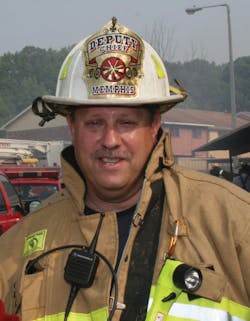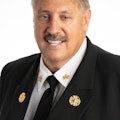I have the opportunity to travel often to speak, consult, or maybe just get away. Inevitably, like some magnet pulling me in a certain direction, I see a firehouse and I stop – often to see if they are selling T-shirts or maybe just to look over the apparatus. Sometimes, I can tell I am interrupting recliner time and the firefighters are not interested in any visitors to the station. But well over 95% of time, the door is open, the coffee pot is brewing (too bad I don’t drink coffee) and the welcome mat is out.
I have met many fine and fantastic firefighters over the years and just sitting around the kitchen table talking has proved invaluable. Some of these firefighters look just like kids to me – and probably because they are kids. I think to myself – Geez, I have been working in this profession longer than how old these kids are. Usually they are in their 20s and they look like they have not even picked up a razor yet. They all look like my 21-year old, who still asks me questions about life.
You still need experience
Eventually, the conversation turns to experience – what’s the worst call you ever dealt with or what’s the best piece of advice you think you can offer? I like the latter, since we all have our war stories and I do not know how you measure one particular tragic event against another. But the sage advice coming from me and the other grayer heads around the table is always interesting for me to listen to. Sometimes, it is something I have not heard before, but it certainly makes sense when you listen to it.
Most of these young firefighter/paramedics do not lack educational experience. They have more than they need. Not only do I see them with these new fancy textbooks that clearly spell out everything from legal liabilities to management of the cardiac arrest, but I see these new and funs ways of learning when I see them playing “Wheel of Fortune” and “Jeopardy” in the classroom. I’ll take “Patient Assessment for $800” is a pretty cool and fantastic way of learning these days. But they are also unique in that they can multitask like no one’s business. They can talk and text on their phone at the same time, while flipping through their iPad doing research, all while the TV is on. When I did a drug calculation, I had to take out a pen and paper. Now these young firefighter/paramedics say there is an app for that.
What these young firefighter/paramedics lack is operational experience. They can have all the classroom education they want, all the apps and Google as many things as they can, but they still lack that all important word called “experience.”
Some of the best advice I heard comes from the older firefighter/medics sitting around the table. It is the stuff that you cannot find in a textbook. Some of the best I have ever heard includes “listen to your patient.” If they tell you they are going to die, they probably will die. I know we have five senses, but there must be other senses they we do not know about. It seems a person can sense when they are going to die. I have seen it quite a few times in my career. If they person tells you they are going to die, you better listen to what they are saying.
Another piece of great advice I heard is to “stay away from the BMWs.” No, I am not talking about the cars. I am talking about the bitchers, moaners and whiners. You know them – the firefighters who come to work every morning whining and crying about everything from the weather, that they need an oil change and how the department is screwing them over. They will drain the energy from you and eventually if you fall into their trap, you’ll start thinking like them and you’ll start being miserable also. When they start their bitching and moaning, I would head to the other side of the engine house.
Another piece of wise advice is to “choose your words carefully on scenes” – especially when civilians or family members are around. I have seen it happen more than once. We all have a certain amount of levity that we do on the job and I have seen laughing on the scene that family members and civilians took the wrong way. They seem to think that you find their emergency funny in some way. I have seen more than firefighter/paramedic confronted by irate family members, patients and even sometimes bystanders because of some joking and laughing on the scene. Harmless as it may be, it is best to leave the humor for inside the fire station.
As a young firefighter/paramedic, everyone is going to give you advice. Be a sponge, but also be a filter at the same time. What may sound like great advice may be someone’s convoluted way of thinking. You should only be listening to all and sifting through the guidance from others to come up with what you think is the right way to be street smart.
For more news and training on EMS, visit http://EMSWorld.com/.
GARY LUDWIG, MS, EMT-P, a Firehouse® contributing editor, has 37 years of fire, rescue and EMS experience. He has managed major fire-based EMS systems in St. Louis, MO, and Memphis, TN. Ludwig is also the immediate past chair of the EMS Section for the International Association of Fire Chiefs (IAFC). He can reached through his website www.garyludwig.com.
About the Author
Gary Ludwig
GARY LUDWIG has served in three fire departments over his career: St. Louis, Memphis, and Champaign, IL. His fire, EMS and rescue career spanned a total of 46 years, and he has been a paramedic for over 44 years. Ludwig served as president of the International Association of Fire Chiefs in 2019-20. He has a Master’s degree in Business and Management, has written over 500 articles for professional fire and EMS publications and is the author of seven books.
Connect with Gary
Email: [email protected]
Facebook: Gary Ludwig
Twitter: @ChiefGaryLudwig
Website: garyludwig.com

